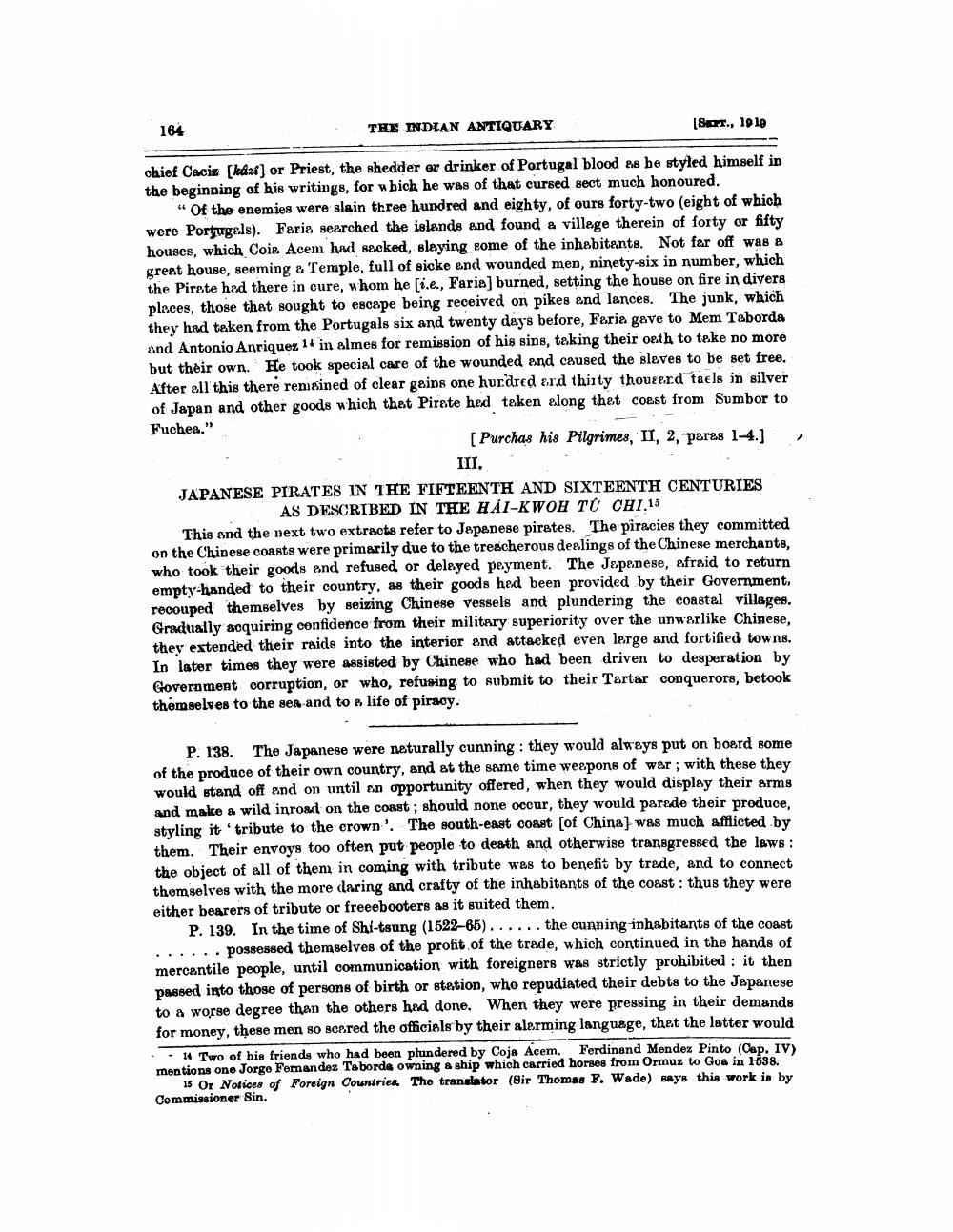________________
164
THE INDIAN ANTIQUARY
[SEPT., 1919
chief Caciz [kázi] or Priest, the shedder er drinker of Portugal blood as he styled himself in the beginning of his writings, for which he was of that cursed sect much honoured.
"Of the enemies were slain three hundred and eighty, of ours forty-two (eight of which were Portugals). Faria searched the islands and found a village therein of forty or fifty houses, which Coie. Acem had sacked, slaying some of the inhabitants. Not far off was a great house, seeming a Temple, full of sicke and wounded men, ninety-six in number, which the Pirate had there in cure, whom he [i.e., Faria] burned, setting the house on fire in divers places, those that sought to escape being received on pikes and lances. The junk, which they had taken from the Portugals six and twenty days before, Faria gave to Mem Taborda and Antonio Anriquez 14 in almes for remission of his sins, taking their oath to take no more but their own. He took special care of the wounded and caused the slaves to be set free. After all this there remained of clear gains one hundred and thirty thouɛerd taels in silver of Japan and other goods which that Pirate hed taken along that coast from Sumbor to Fuchea."
[Purchas his Pilgrimes, "II, 2, paras 1-4.] III.
JAPANESE PIRATES IN THE FIFTEENTH AND SIXTEENTH CENTURIES AS DESCRIBED IN THE HAI-KWOH TU CHI,15
This and the next two extracts refer to Japanese pirates. The piracies they committed on the Chinese coasts were primarily due to the treacherous dealings of the Chinese merchants, who took their goods and refused or delayed payment. The Japanese, afraid to return empty-handed to their country, as their goods had been provided by their Government, recouped themselves by seizing Chinese vessels and plundering the coastal villages. Gradually acquiring confidence from their military superiority over the unwarlike Chinese, they extended their raids into the interior and attacked even large and fortified towns. In later times they were assisted by Chinese who had been driven to desperation by Government corruption, or who, refusing to submit to their Tartar conquerors, betook themselves to the sea-and to a life of piracy.
P. 138. The Japanese were naturally cunning: they would always put on board some of the produce of their own country, and at the same time weapons of war; with these they would stand off and on until an opportunity offered, when they would display their arms and make a wild inroad on the coast; should none occur, they would parade their produce, styling it 'tribute to the crown'. The south-east coast [of China] was much afflicted by them. Their envoys too often put people to death and otherwise transgressed the laws : the object of all of them in coming with tribute was to benefit by trade, and to connect themselves with the more daring and crafty of the inhabitants of the coast: thus they were either bearers of tribute or freeebooters as it suited them.
P. 139. In the time of Shi-tsung (1522-65)...... the cunning inhabitants of the coast possessed themselves of the profit of the trade, which continued in the hands of mercantile people, until communication with foreigners was strictly prohibited: it then passed into those of persons of birth or station, who repudiated their debts to the Japanese to a worse degree than the others had done. When they were pressing in their demands for money, these men so scared the officials by their alarming language, that the latter would
,
14 Two of his friends who had been plundered by Coja Acem. Ferdinand Mendez Pinto (Cap. IV) mentions one Jorge Fernandez Taborda owning a ship which carried horses from Ormuz to Goa in 1538.
15 Or Notices of Foreign Countries. The translator (Sir Thomas F. Wade) says this work is by Commissioner Sin.




